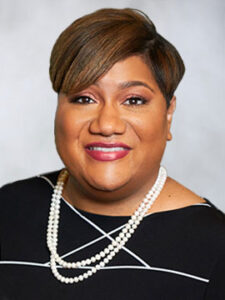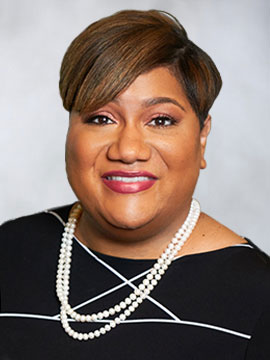 When Rani Morrison became the first Chief Diversity and Community Health Equity Officer at University of Illinois Hospital and Health System, the first order of business was to set the strategy for advancing equity. Six months in, the system is now starting to deploy a number of tactics to achieve that strategy.
When Rani Morrison became the first Chief Diversity and Community Health Equity Officer at University of Illinois Hospital and Health System, the first order of business was to set the strategy for advancing equity. Six months in, the system is now starting to deploy a number of tactics to achieve that strategy.
Morrison, a UI Health veteran prior to taking on the newly-established role, is among the growing ranks of C-Suite executives with diversity in their titles. One annual survey, in fact, found that U.S. employers hired 111 percent more Chief Diversity and Inclusion Officers in 2021 than in 2020,1 making it the role that saw the most significant surge during the 12-month period — despite the title experiencing the largest growth in the previous period at 84 percent.2
Morrison, for her part, brings a background in care management and coordination during the global HIV epidemic that have enabled her to witness both the realities of existing inequities and the need to improve community health.
Health Evolution interviewed Morrison about how UI Health is working to advance equity in its diverse patient population, why she compares the expanding number of diversity officers to the passage of the Affordable Care Act, her career advice for women and more.
As Chief Diversity and Community Health Equity Officer, what are the top strategic priorities since stepping into the role in August of 2021?
Morrison: The first strategic imperative is to try and figure out the strategy. This is a new role for UI Health, so I spent the first few months looking at our needs to determine what I and the office and institution need to address. As I boiled that down, I broke it into three categories: addressing the role to think about people, internal efforts, leadership policies, and how we work internally; creating an inclusive and equitable environment to support our extremely diverse patient population by making sure we are training staff to support them; and the community, including how we partner and invest in the community to address equity, both programmatically and financially.
Advancing equity will be among the topics at the Health Evolution Summit, Apr. 6-8, 2022. Apply to attend.
What are the tactics you use to achieve that strategy?
Morrison: Now that I have put together the strategy, we have tactics to achieve it. We established an anti-racism committee to review policies and create new policies if necessary to make sure we are looking at those with an equity lens to address the needs of our patients and employees. We are also working on leadership development initiatives, diversity education. We partnered to bring anti-bias training to the UI College of Medicine and we are going to roll that out to the entire hospital in the next few months.
We’re reviewing strategies and data to look at race, ethnicity and preferred language to understand our patients and how to communicate with them best in the right language to be culturally competent. And we have a new initiative to capture gender identity and sexual orientation during clinical encounters. Capturing that data is new for us and we’re also investigating how to capture social determinants of health data. My goal would be to capture 100 percent of all that data but I won’t put a time line on that. We are making baby steps. We are also developing several programs to address social determinants of health, including housing, transportation, food insecurity.
How does your background focusing on care continuum, care management, care coordination inform the work you do in your current role?
Morrison: First and foremost, both from a diversity and health equity perspective, I’ve worked with patients at every juncture in the health care system, back to when I was in HIV care. With HIV – and this was before the ACA – the only way you could get health care was a Ryan White HIV/AIDS Program grant. So I’ve seen the benefit of social work, what happens when there’s not a good discharge, how someone shows up can impact the care they receive or not, whether they understand health literacy, whether their families show up, whether that can be a barrier or result in better care. A lot of those things I’ve seen have brought me to this role because I can see diversity, the good bad and ugly, and where we need to be intentional. I want to make sure UI Health is not a part of the problem — ever. I intend to use my influence to address that and make things better for people in our hospitals and the broader community.
What gives you hope about a future U.S. health system that is more affordable, equitable and effective?
Morrison: I think, taking the cynic out, what gives me hope is that because of the last two years there has been a huge push for title like Chief Equity Officer within health systems. Health equity is in our mission statement. We were doing this work anyway but me being in this role formalizes it. There are a lot of systems interested in being more intentional about better addressing these issues for patients and employees. I hope that sticks and lasts beyond 2022, 2023 or 2024 so that in 10 years we will see some real dividends. It’s like when the ACA was passed in 2011. People have their arguments for or against it, but our health care system has been permanently changed and more people have access to health care. Today, it’s hard to think about a time when people were turned away because of a pre-existing condition. There’s still a long-lasting benefit to what happened and that’s why I’d like to see a permanent change in 2030, regardless of job titles, that includes sustained programs and funding to advance equity.
What career advice do you have for other women or people of color working to become C-suite executives?
Morrison: Be impatient, impolite and shatter stereotypes. A lot of times we are programmed as women, and as Black women, to be patient. To wait. We’re told: “If you do the right things and work hard, it will come.” And I think being patient and sitting waiting your turn is highly overrated. I don’t think we should have to wait our turn, if there is an opportunity and you’re the right person, you can make that turn come and not be patient. Sometimes be impolite if need be. It’s a little counterintuitive but there are expectations that come with being a woman — and sometimes you have to shatter stereotypes.
Sources:
1 LinkedIn, From diversity to data, these 10 roles are rising fastest in C-suite hiring
2 LinkedIn, Who’s reaching the C-suite in 2020? These 16 roles have momentum
Photo credit: UI Health










